The Report of the Human Rights Ombudsman for Saint Petersburg for 2018* (hereinafter – “the Report”) is submitted pursuant to the Law of Saint Petersburg of 17 December 1997 No 227-77 “On the Human Rights Ombudsman for Saint Petersburg” (hereinafter – “the Law on the Ombudsman”).
The Report is a core document on the human rights situation in Saint Petersburg, and on the Ombudsman’s and his Office’s activities related to the protection of human rights and to the human rights education. This Report is based on the results of inspections carried out following complaints to the Ombudsman, on analytical and statistical data, information from the authorities, non-governmental organisations (hereinafter – “NGOs”), and media.
The Report contains the Ombudsman’s recommendations on improvement of legislation and practices for better respect of constitutional human rights.
The Report is submitted to the Legislative Assembly of Saint Petersburg, and it is published and is available on the internet. The Ombudsman also transmits his Report to the authorities responsible for implementation of recommendations made in the Report.
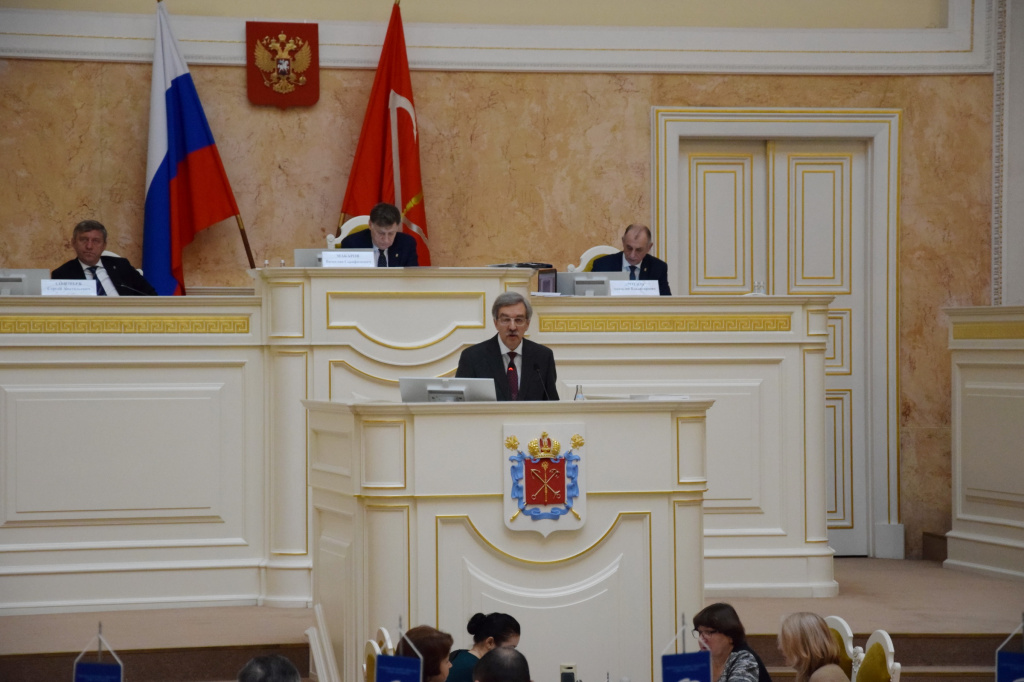
“In order to cure human rights violations, to overcome the most important human rights problems, above all, in the field of protection of fundamental civil and political rights as provided by Articles 2-21 of the Universal Declaration of Human Rights and by the Law on the Ombudsman, me and my Office were engaged in a dialogue with human rights NGOs, bar associations, regional, federal and local authorities in Saint Petersburg. We were supported by the federal ombudsman and the Human Rights and Civil Society Council of the President of the Russian Federation.
We aimed at building a dialogue between people, between civil society and the authorities, and at protection of human rights in the atmosphere of collaboration, and not in the climate of mutual annoyance and incomprehension. It is uneasy and does not always guarantee a result. But this is the way our institution functions – consistently and with perseverance we continue to work for a fair, peaceful and legal resolution of human rights problems.
I sincerely thank all those who contributed to a better respect and protection of human rights in Saint Petersburg, and all those who contributed to this Report”.
Alexander Shishlov
Human Rights Ombudsman in Saint Petersburg
* Full PDF-version of this Report is available in Russian
Complaints to the Ombudsman
Citizens’ complaints are one of the key indicators of the human rights situation. In 2018 6 807 persons made complaints to the Ombudsman. Undoubtedly, the events of the last year influenced the number and the nature of the complaints. Presidential elections led to an increase of the number of complaints concerning the right to participate in managing state affairs. The raising of the retirement age and the drop of real incomes resulted in a higher number of complaints concerning pensions and social protection.
In many cases the Ombudsman’s Office helped people to get housing, to obtain vital medicine, rehabilitation equipment or pension. In some cases the role of the Ombudsman’s Office was to inform the complainer how to proceed, in other cases the Ombudsman intervened in order to protect a person from shortcomings of the authorities.
One of positive examples is securing of the right of conscripts to benefit from deferring their military service for the period of studies. The Ombudsman and Saint Petersburg NGOs working on the protection of conscripts’ rights (above all, Solders’ Mothers of Saint Petersburg) on numerous occasions pointed out at discrimination of conscripts who reached the age of 18 years at school, and at the need to grant them deferring from military service for continuation of studies at technical colleges and at master’s programs. In 2018 the Constitutional Court of Russia upheld this position. On 12 March 2019 the State Duma approved in the third reading corresponding amendments to the Federal Law “On military service”.
The right to life
There are still a number of problems in Saint Petersburg associated with risks of violations of the right to life. Among them are deficiencies in the work of law enforcement agencies, services of insufficient quality in various fields, police violence.
Each year there are deaths of people as a result of provision of services of insufficient quality. In 2018 two young men died because of a break of hot water pipe in a cafe on the first day of heating season.
Saint Petersburg citizens also faced inadequate response of the city authorities to unprecedented snowfalls occurred last winter. As a result, one person died, and more than four thousand people were injured because of insufficient cleaning of snow and ice in the city streets, and this is only according to official data. Cleaning of curtilages and roofs of blocks of flats are paid by citizens but there is no adequate control of the quality of these services.
According to the Saint Petersburg State Prosecutor's Office , there were no ethnical and religious tensions in Saint Petersburg in 2018. However, according to the analytical centre “Sova”, specilised in this field, last year one person died in Saint Petersburg following a xenophobic attack, and ten more people became victims of such attacks.
In February 2018, 13 years after the murder of Timur Kacharava, an antifascist student, the only full-aged suspect among eight perpetrators, Alexander Zenin was arrested. He had been on the wanted list during all this time. Mr. Zenin was accused of murder and hate-mongering with violence (Articles 105 § 2(g) and 282 § 2 (a) of the Criminal Code of Russia). However, in September 2018 he was discharged of murder. In December 2018 the Smolninskiy district court found him guilty of hate-mongering with violence and sentenced him to 1 year and 5 months in correctional colony.
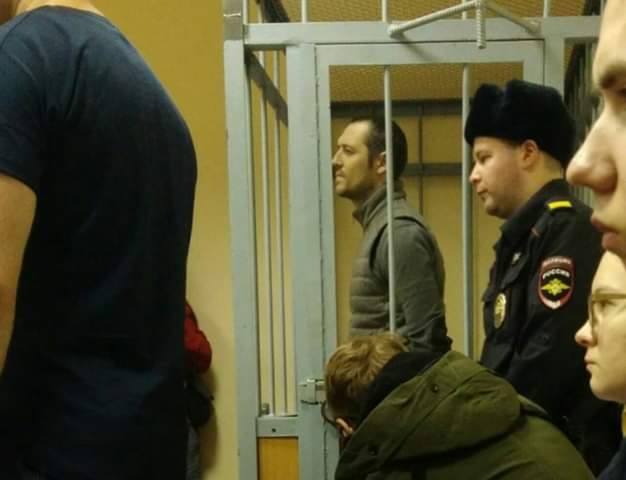
Smolninskiy district court. 19.12.2018
Law enforcement authorities should be an example of human right respect, as required by law. However, complaints to the Ombudsman, inspections carried out following such complaints, information from the St Petersburg State Prosecutor's Office and investigative authorities, and from the public monitoring commission show serious problems of disregard for human rights on the part of law enforcement agencies.
Unlawful acts of violence of law enforcement officers are particularly dangerous. Such crimes not only infringe on human rights but also undermine the authority of State agencies and create distrust to public institutions.
In 2018 information about the death of an enterprener Valeriy Pshenichniy in a remand prison, torture of Pavel Zlomnov accused of unlawful traffic in arms, and a number of other alarming reports about unlawful use of force by law enforcements agents were in focus of public attention. Among circumstances which indirectly factored into the death of Mr. Pshenichniy was the lack of adequate control on the part of the remand prison staff and the absence of CCTV cameras in remand prison cells.
In this regard it should be noted that the European Court of Human Rights indicated in its judgments that State agents are responsible for persons who are under their control, in particular, for those who are in custody or in the premises of law enforcement authorities.
The Ombudsman is seriously concerned by the circumstances of the arrest of persons accused of participation in a terrorist network “Network” Mr. Viktor Filinkov, Mr. Yuliy Boyarshinov and Mr. Igor Shishkin. There are grounds to believe that during the arrest and interrogations they had been subjected to torture with the use of an electric shocker. Following his arrest Mr. Filinkov had been held in custody during 26 hours without any procedural status, and this circumstance was conducive to the above violations. The authorities still did not assess all these circumstances.
Unfortunately, despite well-grounded doubts as to reliability of the official version of the events expressed by experts including members of the Human Rights Council, the law enforcement authorities and the prosecution showed unwillingness to investigate into this matter. Such approach does not permit to prevent the use of torture for obtaining confessions.
The Ombudsman is grateful to members of the public monitoring commission of Saint Petersburg who are dedicated to combating violations of rights of persons deprived of liberty. In 2018 a working group consisted of representatives of the Office of the Ombudsman, the Directory of the Federal Penitentiary Service of Russia in Saint Petersburg and of the public monitoring commission was created in order to react to reports on the use of violence in penitentiary facilities in Saint Petersburg.
The need to secure the right to life, liberty and human dignity of citizens when they interact with law enforcement agents requires criminalization of torture, with corresponding amendments to the Criminal Code. Such approach would be in line with the concluding observations of the UN Committee Against Torture on the sixth periodic report of the Russian Federation adopted on 8 August 2018.
Rights of persons belonging to vulnerable groups
The Ombudsman pays particular attention to protection of rights of persons belonging to vulnerable groups.
Accessible environment for persons with disabilities
The Office of the Ombudsman regularly inspects various public places, alone or in collaboration with the St Petersburg State Prosecutor's Office , NGOs and activists. The situation of implementation of the Ombudsman’s recommendations on securing accessible environment for persons with disabilities improves slowly but consistently. For instance, this is the case of securing parking places in front of court buildings for cars belonging to persons with disabilities.
Rights of persons with disabilities
Persons with mental disabilities who live in State-run social institutions belong to a particularly vulnerable group of people. In 2018 the problem of transfer of young people with multiple severe developmental disorders from child institutions to institutions for adults started to get resolution – units of intensive care were created in three institutions for adults for young people with severe disabilities who are transferred there from child institutions.
According to experts, the public system of social institutions for children and adults with mental disabilities is de facto oriented at isolation, and not at social integration of persons with disabilities. It is necessary to promote various forms of support replacing institution care, such as assisted living. In 2017 the Ministry of Labor of Russia elaborated such recommendations (Saint Petersburg NGOs “Perspectives” and “GAOORDI” are among pioneers of introduction in Russia of various forms of assisted living). However, statistics show that these recommendations are far from being implemented in Saint Petersburg. For instance, in eight social institutions for adults live 6 613 people, while in two houses dedicated to assisted living live only 26 persons.
Assisted living house of “GAOORDI”. 22.05.2018
Rights of LGBT people
The problem of discrimination of minorities, notably, members of LGBT community, is closely related to the respect of the right to human dignity.
17.05.2018
According to LGBT organization “Coming out”, in 2018 16 cases of violence against LGBT people had been reported, with 18 victims. In less than a third of cases victims reported violence to the police, and only in one case criminal proceedings were instituted.
One of the forms of discrimination against LGBT people were attempts to obstruct public and cultural events organized by LGBT community. For instance, on 24 October 2018 a group of individuals one of whom was a member of the State Duma, derailed the opening of LGBT film festival “Side by Side” by making false reports of hostage-taking. After the location of the film festival had been changed, the opponents of the event derailed it again by making a report of a bomb threat, which, once again, was not confirmed. Unfortunately, no one of these hooligans was held responsible.
Right to housing
Complaints to the Ombudsman concerning the right to housing are always the most numerious. Unfortunately, in 2018 there were no significant positive changes. Once again, the annual housing plan of granting social housing had not been complied with. The number of families which could benefit from city target programs has decreased.
There are around 70 thousand communal flats in Saint Petersburg, with more than 200 thousand families living there. If the same funds as now are allocated for resettlement of these families, this process would last for decades. It should be noted that social subsidies for housing under the target program of resettlement of communal flats do not by themselves lead to a reduction of the number of communal flats, since rooms left can remain on the real estate market.
The most serious housing problems are solved by cumulative efforts of State and public human rights defenders, members of the Legislative Assembly and the Governmnent of Saint Petersburg. In 2018 such problem was securing of the right to housing for large families who had been excluded from the housing plan for 2018 (for the first time since eight years) and who protested. As a result, funds were allocated for housing to be provided to large families in autumn 2018.
Labor rights
In 2018 the problem of multi-billion salary arrears for construction workers of the city metro could not be resolved, despite efforts of supervisory authorities and promises of the city government. Pickets and rallies of construction workers who did not receive the promised salaries has continued in 2019, including in front of the Government of Saint Petersburg.
One of the reasons of these arrears is that the public contracts for construction ignored provisions of a sectoral multilateral wage agreement (funds allocated for salaries were underestimated). Trade unions also played a negative role, since they did not control implementation of this agreement.
Right to freedom of peaceful assembly
Problems related to securing of the right to freedom of peaceful assembly have intensified in the context of rising social tensions and civic engagement. Since protests against the pension reform were not officially approved, in 2018 there were a number of unauthorized actions, with hundreds of people arrested (on 5 May – more than 200 persons, on 9 September – around 600 persons).
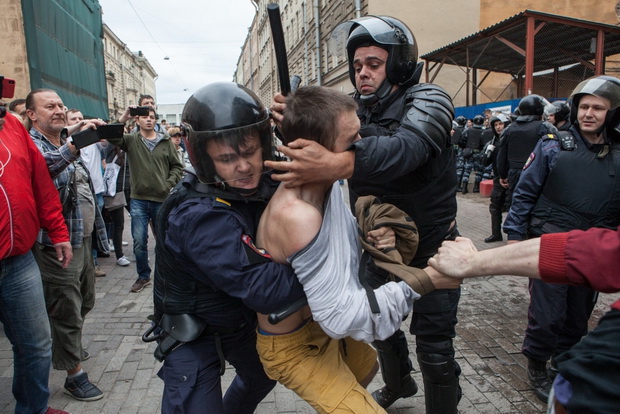
Photo: Elena Lukjanova, "Novaja gazeta". 09.09.2018
The Ombudsman received complaints about violations of rights of participants of the above events as well as of simple passers-by occurred both during the arrests and at trials.
The Ombudsman, together with the Union of journalists of Saint Petersburg and the Leningrad region, on numerous occasions discussed with the chiefs of law enforcement agencies difficulties of journalists’ work at public events. Till August last year agreements reached as to respect of the journalists’ rights were generally respected. However, at the rally of 9 September against the pension reform at least ten journalists became victims of violations. The Ombudsman transmitted to the Main Directorate of the Ministry of Internal Affairs the results of his monitoring of human rights violations occurred at that rally. Unfortunately, the materials submitted (including video recordings of violations) were disregarded.
In October 2018 the Human Rights Council of the President of Russia held its meeting in Saint Petersburg, with a round table on the freedom of assembly. The Human Rights Council recommended amendments to Saint Petersburg legislation and practices in this field. The Governor of Saint Petersburg ad interim Alexander Beglov agreed to the need of such amendments. However, obstacles to enjoyment of the constitutional right to freedom of peaceful assembly in Saint Petersburg voiced by the Ombudsman in his annual reports and before the Legislative Assembly, still remain. And from October 2018 citizens face new problems even when they wish to hold a solitary picket – de facto the only remaining way to freely publicly express their views. This new schema of disturbance of pickets consists in making false reports on a crime (generally coming from the same person) or arresting of a picketing person by the police on the ground that some doubt exist as to the authenticity of his or her ID. During last months of 2018 more than 30 such arrests were reported.
After the meeting of the Human Right Council in Saint Petersburg the work on amendments to legislation on public events became more active. Four new dedicated locations for holding public events in a simplified order (so-called Hyde parks) were created, including Lenin square, very popular among organisers of public events.
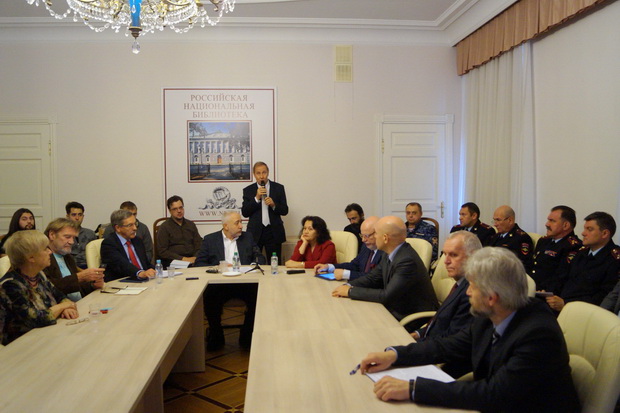
The meeting of the Human Right Council in Saint Petersburg. 18.10.2018
On 6 February 2019 the Legislative Assembly adopted on the first reading a draft law on amendments to Saint Petersburg legislation on public events. However, the Ombudsman believes that this draft does not address a number of problems. Therefore, the Ombudsman recommended to the all parliamentary factions to upheld the following amendments to the second reading:
- raise the number of participants of public events in Hyde parks up to 1000 persons, and in one location up to 5000 persons;
- ensure publication on the Internet of notifications about intention to hold a public event (such practice is implemented in Moscow);
- do not use Hyde parks for cultural, recreational and sport events which are often used as a pretext to ban political gatherings;
- to make one Hyde park in the city centre.
In the choice of a Hyde park in the city centre the Ombudsman suggests to use the positive experience of security measures adopted at public gatherings of fans during the FIFA World Cup 2018 in the historical centre (above all – the fan zone at the Konnyushennaya square which daily welcomed several dozens of thousands of people).
Right to fair trial
The problem of access to a lawyer for persons arrested at public protests remained unresolved in 2018. The Ombudsman is aware of cases of unjustified refusals of courts of motions to grant access to a lawyer (in particular, the Kalininskiy district court refused such motion made by a person arrested on 5 May), and of cases of removal of a lawyer from a hearing of the Primorskiy district court at which several administrative cases against persons arrested on 9 September were unlawfully heard at the same time. However, the Qualification Commission of Judges did not find any violations in these cases.
In 2018 the Ombudsman continued his project “Court monitoring” together with non-commercial partnership “Centre of legal programs of Leonid Nikitinskiy”. The aim of this project is to get unbiased information about securing of the right to an open hearing and on the transparency of the system of justice. Volunteers monitored 18 district courts and 10 judicial circumscriptions of justices of the peace, tested their web-sites and visited court hearings. The results of the monitoring were discussed with the Human Rights Council and representatives of the judiciary.
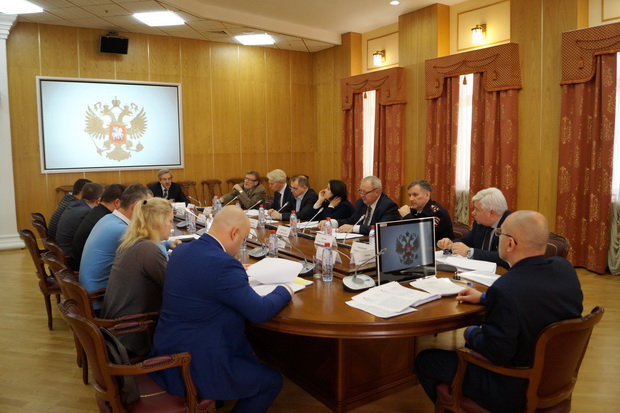
The meeting of the Human Rights Council and representatives of the judiciary. Saint Petersburg City Court. 29.11.2018
On the Ombudsman’s initiative upheld by the president of the Saint Petersburg City Court Mr. Alexey Lakov a cross-agency meeting was organized on the access to court buildings in off-hours and on amending the rules on the presence of visitors in courts. The participants of this meeting agreed to continue and further develop public monitoring of courts and to discuss identified problems. Such collaboration will facilitate the openness of court hearings, and, according to Mr. Leonid Nikitinskiy, the author of the project “Court monitoring”, it will also facilitate creation of “citizens friendly interface of courts”.
Right to freedom of association
Legislation on NGOs labelled foreign agents is still applied with discrimination, since the notion of “political activity” remains unclear which makes possible to interpret it largely and arbitrarily. Since 2014 the Ombudsman emphasized in his annual reports that this notion should be clarified. However, these recommendations, as well as recommendations of the Human Rights Ombudsman of Russia and of the Human Rights Council, were not taken into account.
In 2018 for the first time an NGO focusing on health issues was included in the list of “foreign agents”. It was autonomous non-commercial organization fighting against HIV/AIDS and for health protection of socially vulnerable groups of population “Centre of socio-informational initiatives “Action”.
Another Saint Petersburg NGO – autonomous non-commercial organization “Youth human rights protection group” which was also included in the list of “foreign agents” in 2018 – refused to conduct its educational activities in this status, and decided to liquidate.
In 2018 two NGOs – interregional trade union “Labor association” and autonomous non-commercial organization “Centre for independent social research” – could get quashed in appeal decisions on inclusion them in the list of “foreign agents”. The Ombudsman in his Report for 2017 denounced unlawful application to these NGOs of legislation on foreign agents and undesirable non-governmental organisations.
In 2018 the Supreme Court of the Russian Federation quashed a decision of the Saint Petersburg City Court on liquidation of “Labor Association” due to its political activities, receipt of foreign grants and refusal to register as a “foreign agent”. The Supreme Court found that a refusal of this trade union to register as a “foreign agent” could not be regarded as a gross violation that necessitate liquidation of the organization since it does not create a real threat to public order and security. According to the Supreme Court, the St Petersburg State Prosecutor's Office did not provide evidence of real negative consequences of a failure to register as a “foreign agent”.
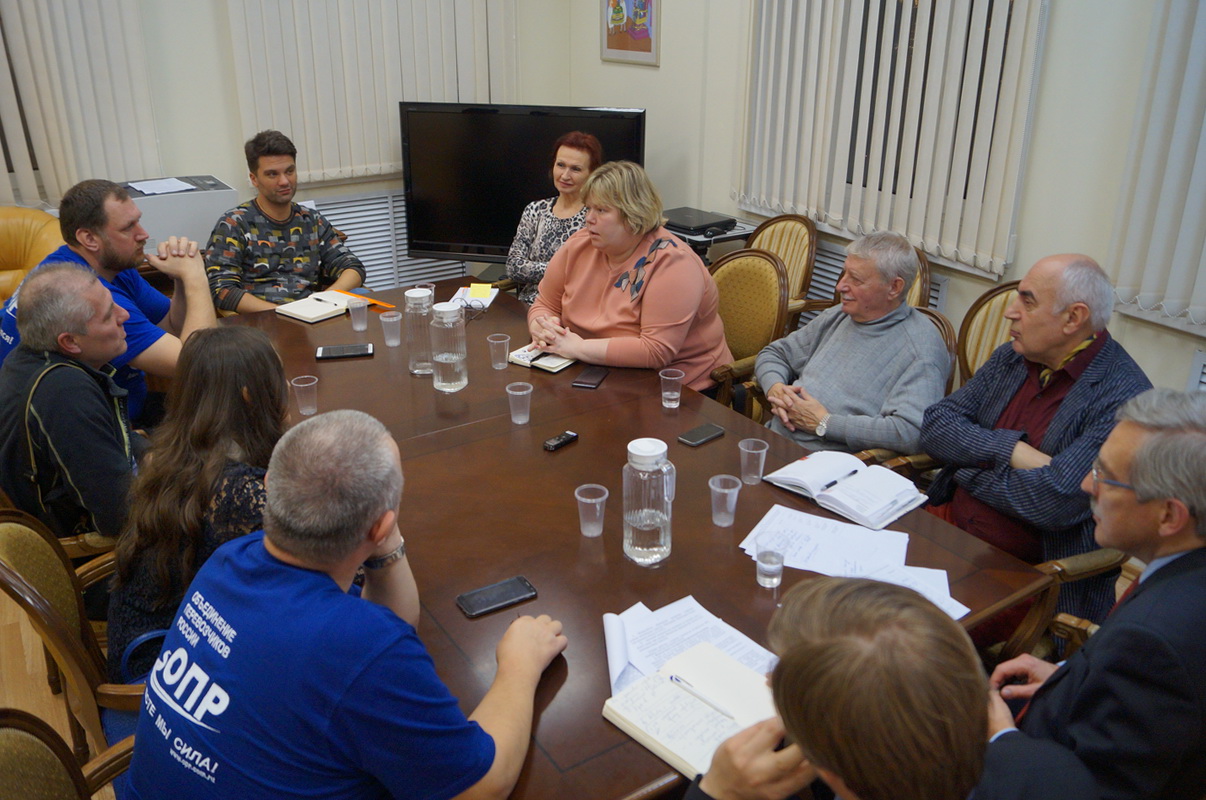
The meeting with St.Peterburg's “foreign agents” . Ombudsman's office. 02.11.2018
A higher court also quashed a decision of the justice of peace of circumscription no. 206 on administrative offence of “Centre for independent social research” for its participation in activities of an “undesirable foreign or international non-governmental organisation”.
With an active participation of the Ombudsman it became possible to avoid an eviction of Saint Petersburg historic educational charity “Memorial” from its office at Raziezzhaya street, 9A. This NGO has occupied this office for more than 20 years. The Ombudsman, members of the Legislative Assembly of Saint Petersburg, human rights defenders and the Human Rights Council intervened in order to ensure a renewal of the lease (this question was even discussed at a meeting of the Human Rights Council with participation of the President on 11 December 2018). On 11 March 2019 the Committee of property relations of Saint Petersburg signed an order authorizing renewal of the lease for another ten years. Therefore, “Memorial” of Saint Petersburg will be able to continue its educational and human rights activities.
Right to free elections
The central event concerning the right to participate in State affairs were elections of the President of the Russian Federation.
Before the elections the Ombudsman issued recommendations on organization and conduct of campaigning activities. For a proper conduct of the elections the Ombudsman, together with the Elections Committee of Saint Petersburg, held a seminar with participation of representatives of the Main Directorate of the Ministry of Internal Affairs of Russia in Saint Petersburg and the Leningrad region, the Committee on law, order and security of Saint Petersburg, NGO “Observers of Saint Petersburg”, territorial elections commissions, and of regional offices of political parties “United Russia”, Communist party of Russia, Liberal Democratic Party of Russia, “Party of Growth”, “Yabloko”, and of campaign offices of candidates for presidential elections Mr. Pavel Grudinin and Mr. Vladimir Putin.
Monitoring carried out by the Ombudsman showed that many of his recommendations had not been followed, including those concerning the right to campaign (representatives of campaign offices of most candidates complained about unjustified refusals to approve campaigning public events). Most participants of the election process are of the view that the number of violations during the presidential elections was lower than at previous elections. However, many systemic problems persist.
At the beginning of 2019 the Ombudsman issued a special report on violations of legislation on elections identified in Saint Petersburg, and its application during the presidential elections. The report also contains recommendations aiming to avoid such violations in the future, and first of all – at the upcoming elections of a governor of Saint Petersburg and of local deputies, scheduled for September 2019.
18.03.2018
At the previous elections of local deputies in 2014 violations identified by the Ombudsman were related to the lack of information about activities of election commissions of municipalities. Their location and working hours were often hard to find, and it was even difficult to access their premises. This time the situation is also unsatisfactory. The Elections Committee of Saint Petersburg issued recommendations on publishing of information about activities of election commissions at web-sites of municipalities. The Ombudsman will follow up compliance with these recommendations.
It is obvious that free elections mean not only technical organization of the elections process but also the possibility to make an informed choice at the basis of competitively, public discussion, comparison of different programs of development of the city and of budget priorities. Whether Saint Petersburg citizens would have such possibilities at the upcoming elections of the governor, will be clear after registration of candidates.
Difficulties are first of all related to a so-called municipal filter which is set in Saint Petersburg at a maximum level – 10 %. But even in these conditions participation in the elections of at least eight candidates can be ensured. There are six factions in the Legislative Assembly which represent different political parties. If they wish to nominate candidates for governor, they should have such possibility.
Legal education
Legal education and informing on human rights and freedoms and their protection are among the most important objectives of the Ombudsman as an independent public human rights defender. The Ombudsman, alone or in collaboration with federal and regional colleagues, authorities, the Human Rights Council, Russian and international human rights NGOs, judges’, lawyers’, notaries’ and journalists’ associations, universities, libraries and museums organizes conferences, round tables, seminars, competitions and legal advice.
For his contribution to legal education of citizens the Ombudsman got in 2018 a “Justice” award. This award is established by the Council of the Association of jurists of Russia for Saint Petersburg and the Leningrad region. This is a sign of recognition by legal community of the work on development of institutes of democratic society and of the rule of law.
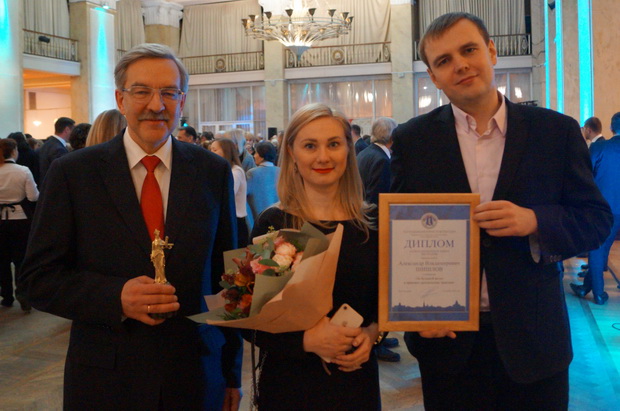
Alexander Shishlov and the staff members of the Ombudsman’s office Natalia Zhirnova and Mikhail Evdokimov with “Justice” award. 07.12.2018
Legal advice
The Ombudsman continues his collaboration with the Mayakovskiy central public library. This collaboration includes providing legal advice in the library on various topics and organizing lectures and seminars on various issues of human rights defense. In October 2018 the Ombudsman and the library carried out a project “The day of social and legal information for elderly persons “Your rights – questions and answers”. Under this project more than 600 people could get over 1400 legal consultations of specialists of 14 State agencies. As follows from the complaints to the Ombudsman, activities of these agencies generate the most questions of retired persons. Staff members of the Ombudsman’s office, representatives of the Saint Petersburg Bar Association and of Association of notaries, as well as the international lawyers’ association “Saint Petersburg” also provided free legal advice.
The day of social and legal information for elderly persons “Your rights – questions and answers”. 10.10.2018
Education projects of the Ombudsman
In March 2018 the Ombudsman initiated creation of a regional interagency working group on coordination of activities aiming at implementation of the Conception of the State policy on memorialization of victims of political repressions. This initiative was supported by the governor of Saint Petersburg. The Ombudsman participates in a similar working group at the federal level created in 2016 pursuant to an order of the President. In October 2018 a meeting of this working group was held in Saint Petersburg, and implementation of this concept was discussed. The following recommendations were addressed to the Administration of Saint Petersburg:
- decide on mounting of a memorial marking the place of discovery of remains of victims of the Red Terror near the Peter and Paul Fortress, and on their burying at the memorial cemetery of victims of 9 January.
- put in place a program of visiting by high schoolers of the Levashov memorial cemetery, and of other memorial sites related to the State Terror.
The key project of the Ombudsman aiming to develop of the youth’s interest in human rights is the Saint Petersburg student competition of research and art works “Human Rights”. The award ceremony annually takes place in the State museum of political history of Russia as a part of events organized on the occasion of the International Human Rights Day (10 December). In 2018 students from 23 Saint Petersburg universities participated in the competition.
International cooperation
Since the Ombudsman has a statutory obligation to protect fundamental civil and political human rights as they are provided by the Universal Declaration of Human Rights, development of his cooperation with international human rights institutes is very important.
Russian ombudspersons regularly discuss mechanisms and practical experience of implementation of international obligations in the field of human rights with representatives of Moscow offices of the UN High Commissioner for Human Rights, UN High Commissioner for Refugees, and of International Organization for Migration. On the initiative of the federal ombudswoman the Eurasian Alliance of Ombudspersons was created in 2017. Cooperation within the framework of the Global alliance of National Human Rights Institutions is also developing. Many of Russian ombudspersons are members of the European Ombudsman Institute (EOI).
On 14 September 2018 a meeting of the board of EOI was held in the UN Vienna International Centre. The Ombudsman, who is currently vice-president of EOI, and his colleague from the Sverdlovsk region, a EOI board member Ms. Tatiana Merzliakova, took part in this meeting. The following questions were discussed at the meeting: the role of ombudspersons in conflict resolution between individuals and the authorities, the impact of new European rules on personal data protection (in force since 2018) on the processing of complaints to ombudspersons. A draft project of a memorandum on cooperation between EOI and the European federation of UNESCO Clubs was approved.
On 22 November 2018 the Ombudsman together with the consulates general of Norway and of the Netherlands in Saint Petersburg organized a round table “Domestic violence as one of the forms of discrimination against women”. The round table took place in the Higher School of Economics. 12 regional ombudspersons, representatives of the federal ombudswoman, of the Government of Saint Petersburg and of NGOs participated in the round table. The Russian office of the Office of the UN High Commissioner for Human Rights and the Program office of the Council of Europe in Russia were also among international participants.
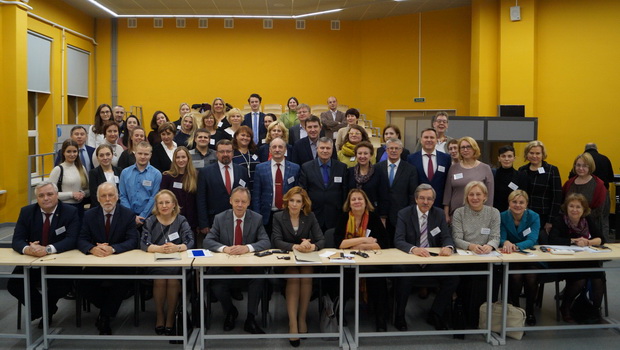
The participants of the round table “Domestic violence as one of the forms of discrimination against women”. 22.11.2018
Initiatives concerning repeal of the constitutional principle of priority of international law, withdrawal of Russia from the Council of Europe, denunciation of the European Convention on human rights have been recently heard. The report of the European Court of Human Rights for 2018 for the first time mentions the possible loss of Russian people of the access to this international judicial organ in case of termination of membership of Russia in the Council of Europe.
According to the Federal Bar Association of Russia, “the loss of the possibility to access the European Court will make the situation of Russian citizens worse”, and the risks related to the cessation of the membership in the Council of Europe “are so important that they outweigh political considerations”. This position is also shared by the Saint Petersburg Bar Association.
The Ombudsman stressed on numerous occasions that cooperation with international human rights institutions and membership in the Council of Europe are critically important for ensuring rights and freedoms in Russia. International human rights standards promote development of national law and practices, and the respect for human rights and human dignity.

